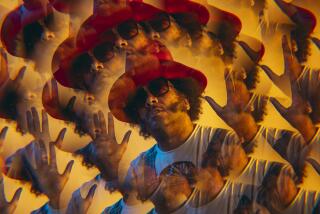Tommy Lee Jones talks about ‘The Sunset Limited’
- Share via
In the HBO film “The Sunset Limited,” Tommy Lee Jones plays White, a suicidal professor who attempts to jump in front of the subway of the title. He’s saved, or thwarted, by Black (Samuel L. Jackson), an ex-con who has fervently embraced the Bible’s teachings. In Black’s sad little apartment, the two men battle over the nature of faith and the value of life in a high-stakes dance between equal and opposing partners. The film, which began as a play, was written by Cormac McCarthy.
Jones has known McCarthy for more than a decade and worked on the Coen brothers’ film adaptation of the author’s “No Country for Old Men.” As with the 2005 film “The Three Burials of Melquiades Estrada,” Jones directed and produced “The Sunset Limited,” in addition to his acting duties. He shot the film in Tesuque, N.M., where he has a home and where McCarthy also lives, so the Pulitzer Prize-winning novelist was on set for rehearsals.
How did you first come across the play?
I have an interest in Cormac’s work, and so I just read it all.
What was it about this work that made you choose it as your next project to perform, direct and produce?
The language. It’s an awfully good play. It’s spontaneous, but yet at the same time it is a formal, classical dialectic. The ideas are big, and the language is beautiful. As I thought about it, I figured out a way to be able to do it inexpensively. We had 131/2 shooting days.
What was the hardest part of doing all three jobs at the same time?
Having any two of those jobs makes the third one a lot easier. You have fewer people to talk to.
Was there any work done on the play to translate it for the screen?
No. We shot the entire play, or maybe 98% of it, but after looking at it as a piece of film, we found a way to get the running time to 90 minutes, and it helped. You don’t mind the amount of time it takes to read it. I suppose on the stage you don’t mind the amount of time you spend sitting there. But movie audiences are different; television screens are of a different scale. So we did some editing. We certainly made no attempt to improve Cormac’s language.
Was it ever suggested to you to open it up, to try to bring it out into the world?
I anticipated that suggestion would come up. So I dispelled any of those ideas before they could catch hold anywhere.
How?
I said, “We’re not going outside.” I would invoke the French existentialist Sartre: There’s no exit. And then it would become a really cool creative idea, to not spend the time and money to go to New York.
How quickly in the process did you think of Samuel L. Jackson?
Immediately. He’s the right guy for the part. He certainly can handle the language. He’s a friend. I knew he had the experience in the theater. I knew that he likes to work, he’s worked a lot, and there’s no nonsense to him. He doesn’t waste any time. Which is a good thing, because I didn’t have a lot of time. The biggest page count we had [in one day] was 14. The shortest was nine. That’s a lot of pages.
Was any scene particularly difficult to direct?
No, but Black’s jailhouse story [recounting a brutal fight] has a wonderful rhythm, and it’s long. Sam had to do that six or seven times, because it really requires a wide variety of camera angles. It was perfect every time. It was extraordinary to see the degree of preparation and energy that Sam demonstrated doing that scene precisely the same way seven times in a row. But that’s why you go to Sam Jackson first. I’m telling you, the man could have done it all day.
Was there anything you did to keep from getting depressed or disheartened while working on your suicidal character?
I work all day every day, and I learned a long time ago not to take the parts I play personally.
So you’re not a nihilist, you just play one on TV?
That’s right.
More to Read
The biggest entertainment stories
Get our big stories about Hollywood, film, television, music, arts, culture and more right in your inbox as soon as they publish.
You may occasionally receive promotional content from the Los Angeles Times.










